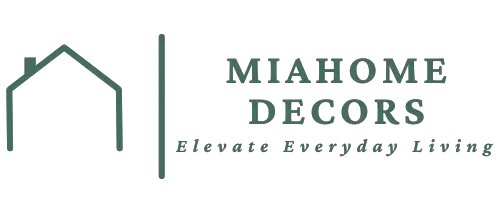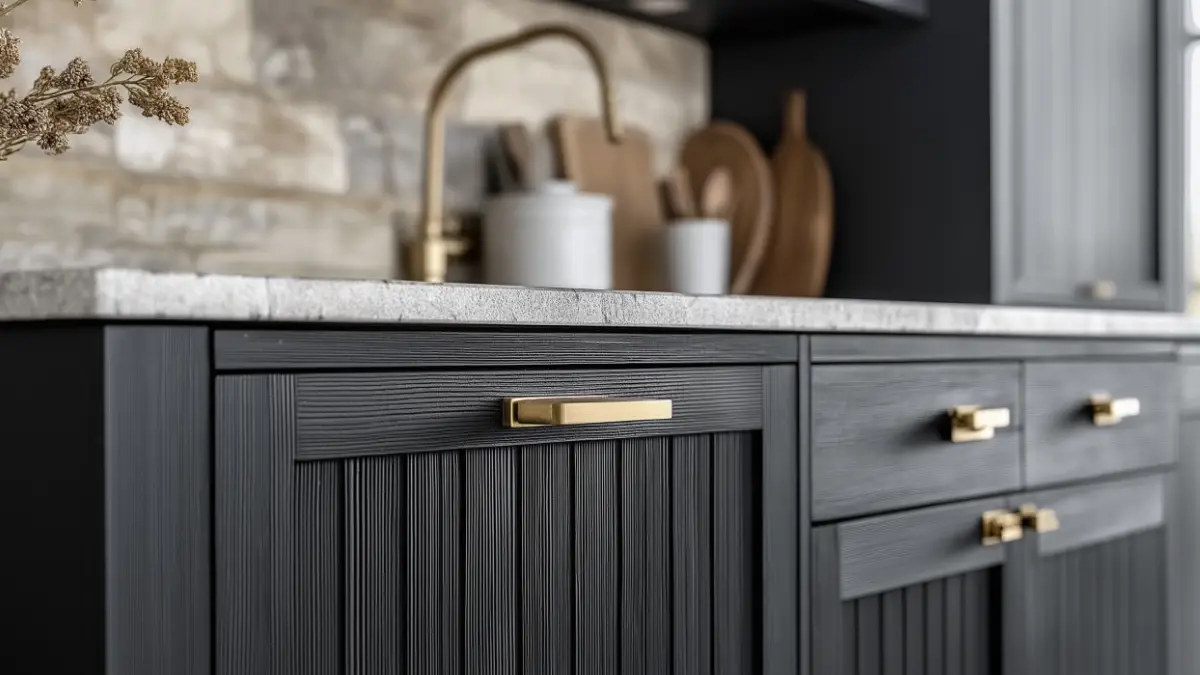Bold & Beautiful: Dark Kitchen Ideas for a Dramatic and Modern Makeover
Table of Contents
In recent years, dark kitchens have emerged as a standout trend in modern interior design. No longer confined to bright white or neutral palettes, today’s kitchens embrace rich, moody hues that bring a sense of sophistication, drama, and bold character to the heart of the home. According to Houzz’s 2024 kitchen trends report, dark cabinetry is one of the most searched features by homeowners looking to elevate their space.
A dark kitchen doesn’t mean sacrificing light or warmth. In fact, when done thoughtfully, it can feel inviting, elegant, and deeply personal. From matte black cabinetry and deep navy islands to charcoal backsplashes and walnut wood accents, there are endless ways to incorporate darker tones without overpowering the space.
This post explores a variety of bold and beautiful dark kitchen ideas for a modern makeover. Whether you’re remodeling your entire kitchen or just updating key elements, these ideas will help you achieve a look that’s rich in style and surprisingly versatile. We’ll dive into layout tips, finish choices, lighting strategies, and material pairings that bring out the best in darker palettes—while ensuring your kitchen remains functional and inspiring.
Finding the Right Shade: Choosing the Perfect Dark Color Palette
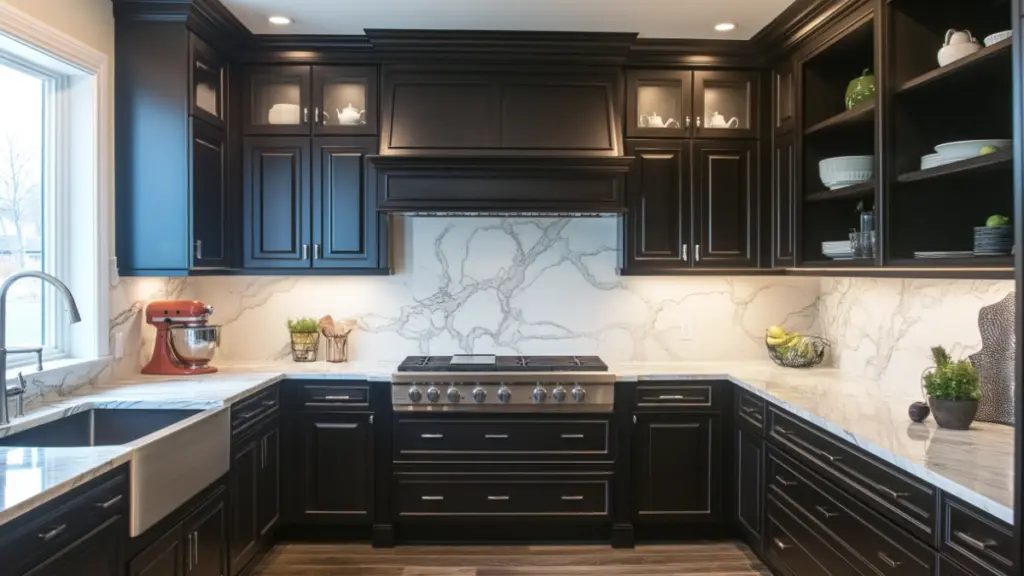
The first step to designing a dark kitchen is selecting the right palette. From soft graphite tones to saturated navy, forest green, espresso brown, and classic matte black—each shade can create a different mood.
Charcoal and slate tones are great for modern industrial looks, while navy and deep teal bring a classic or coastal twist. Black is bold and timeless, especially in matte or soft-touch finishes. Pair your chosen dark tone with neutral, warm, or contrasting materials to prevent the space from feeling flat or too stark.
Consider how the color will interact with your room’s lighting. In north-facing kitchens with less natural light, go for richer tones with warm undertones like dark chocolate or deep green. In well-lit spaces, bold blacks and blue-grays make a strong and elegant statement.
Table: Popular Dark Kitchen Color Palettes and Their Effects
| Color Option | Mood Created | Best Used With |
|---|---|---|
| Matte Black | Bold, minimal, timeless | Gold hardware, white counters |
| Deep Navy | Classic, cozy | Marble backsplash, brass accents |
| Charcoal Gray | Sleek, industrial | Concrete, stainless steel |
| Forest Green | Earthy, elegant | Natural wood, gold fixtures |
| Espresso Brown | Warm, grounded | Beige stone, copper tones |
Pairing Dark Cabinets with Light Countertops for Contrast
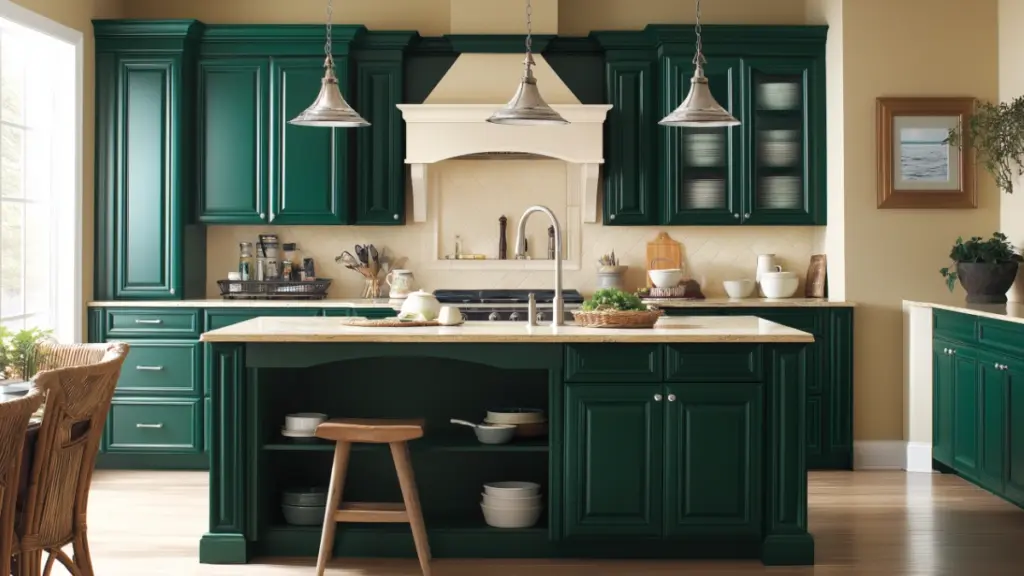
One of the most effective ways to create balance in a dark kitchen is to pair dark cabinets with light countertops. This contrast helps open up the space visually while adding dynamic interest.
Marble, quartz, or butcher block countertops in shades of white, cream, or light gray work beautifully with black, navy, or charcoal cabinetry. The lighter surface reflects light, keeping the kitchen from feeling heavy. You can also extend your countertop material into a matching backsplash to create visual flow.
For extra style points, opt for a waterfall countertop that runs down the side of an island or peninsula. The clean edge creates a sculptural focal point in your kitchen while highlighting the cabinetry below.
Table: Contrasting Pairings for Cabinetry and Counters
| Cabinet Color | Recommended Countertop Color | Visual Effect |
|---|---|---|
| Black Matte | White quartz or marble | Bold and modern |
| Navy Blue | Pale gray stone | Cool and elegant |
| Forest Green | Warm beige or ivory | Natural, grounded |
| Charcoal | Light concrete or terrazzo | Urban and contemporary |
Using Texture and Finish to Add Depth and Interest
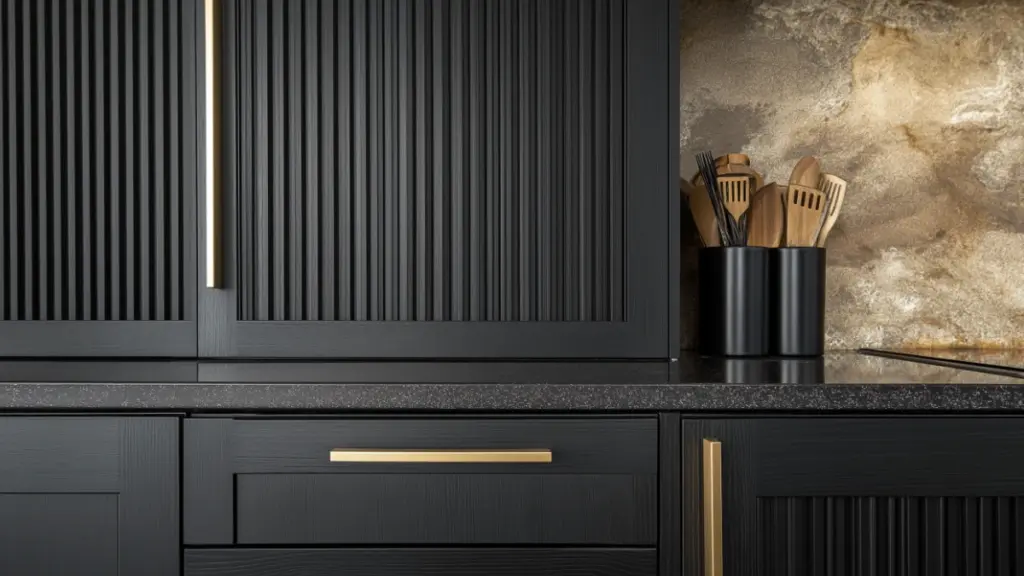
When working with a darker color palette, incorporating varied textures and finishes is essential to prevent the space from feeling flat. Texture not only adds visual depth but also introduces warmth and dimension to balance the intensity of deep hues.
Start with your cabinetry. High-gloss black cabinets reflect light and feel sleek and ultra-modern, while a matte or satin finish offers a softer, more sophisticated appearance. Wood-grain finishes in deep walnut or smoked oak bring a natural texture that pairs beautifully with black, gray, or navy.
Don’t stop with cabinetry—extend texture to the backsplash, flooring, and hardware. Consider herringbone or stacked tile patterns for visual intrigue, or use handmade tiles with slight imperfections for artisanal charm. Fluted glass cabinets or ribbed wood panels can break up solid color blocks while staying on-theme.
Natural stone, concrete, and metallic finishes also bring unique textures that elevate the entire design. Even lighting choices can add texture—think matte ceramic pendant lights, hammered brass fixtures, or wire mesh shades.
Table: Finishes and Textures That Enhance Dark Kitchens
| Feature | Finish/Texture Option | Design Benefit |
|---|---|---|
| Cabinet Doors | Matte, satin, or wood veneer | Depth and softness |
| Backsplash | Handcrafted tile, stacked stone | Visual texture and movement |
| Countertop | Honed or leathered stone | Adds a tactile, upscale feel |
| Hardware | Brushed brass, black matte | Contrasting sheen |
| Flooring | Wide-plank wood or slate tile | Warmth and grounding effect |
Maximizing Light in a Dark Kitchen Design
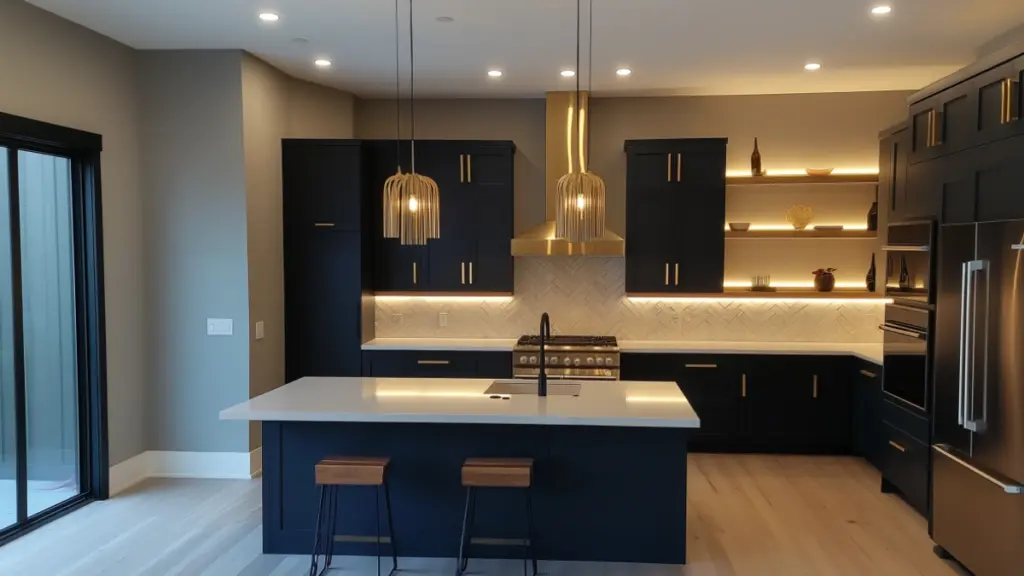
Proper lighting is crucial in any kitchen, but especially in a dark one. A well-lit space prevents deep colors from feeling too moody or enclosed, ensuring your kitchen remains both stylish and functional.
Start with layered lighting. Use a combination of overhead fixtures, under-cabinet lighting, and task lighting to cover all functional zones. Pendant lights over islands and dining nooks add personality, while recessed lights provide broad ambient illumination.
Choose bulbs that emit warm white light (around 2700K–3000K) to balance cool undertones in dark cabinetry. If your kitchen has windows, amplify natural light with reflective surfaces—glossy backsplashes, glass cabinet inserts, or polished metal fixtures.
Mirrored or metallic backsplashes can also bounce light around the room. If you’re limited on natural light, consider installing a skylight or transom windows to brighten the space from above.
Table: Kitchen Lighting Plan for Dark Interiors
| Lighting Type | Placement | Function |
|---|---|---|
| Overhead Pendant | Above island or table | Decorative + ambient |
| Under-Cabinet LEDs | Beneath upper cabinets | Task lighting |
| Recessed Lighting | Ceiling zones throughout kitchen | Overall illumination |
| Accent Lighting | Inside glass cabinets or shelves | Highlight decor and depth |
Combining Dark Cabinets with Bold Backsplashes
Backsplashes offer a great opportunity to inject bold personality into your dark kitchen. Whether you choose to match or contrast, the right backsplash design can become a statement piece that ties the entire room together.
For a monochrome effect, pair dark cabinetry with equally moody backsplash materials like black marble, dark quartz slabs, or charcoal subway tile. This creates a seamless, cocoon-like ambiance perfect for modern minimalism.
If you prefer contrast, try white marble with bold veining, zellige tiles in glossy finishes, or even graphic patterned cement tiles. The play of color and pattern can act as a visual counterbalance to the richness of dark cabinetry.
For a luxe look, consider using a slab backsplash that extends up the wall behind the stove or sink. This design choice feels both modern and timeless, especially in spaces with clean lines and integrated appliances.
Table: Backsplash Pairing Options for Dark Kitchens
| Cabinet Color | Suggested Backsplash | Effect Achieved |
|---|---|---|
| Matte Black | White herringbone tile | High contrast and graphic style |
| Navy Blue | Marble slab with gray veining | Elegant and elevated |
| Charcoal Gray | Glossy green or emerald tile | Moody with rich tone-on-tone depth |
| Espresso Brown | Cream zellige tile | Warm and artisan-inspired |
Incorporating Natural Elements for Warmth and Balance
To soften the look of a dark kitchen, integrating natural elements like wood, plants, and earthy tones adds balance and warmth. This blend of bold and organic creates a welcoming space that feels grounded and inviting.
Wood is the easiest way to bring this warmth in. Consider using wood countertops, exposed ceiling beams, floating shelves, or even a butcher block island top. Choose lighter woods like oak or ash to create contrast, or go for walnut and smoked finishes for tonal depth.
Adding greenery—real or faux—introduces color and freshness. Herbs on the windowsill, hanging plants, or even a vertical garden wall can lighten the mood of a dark-toned kitchen.
Earthy accessories like stone bowls, ceramic vases, and linen textiles also add tactile charm and visual interest without overpowering the palette.
Table: Natural Elements to Soften a Dark Kitchen
| Element | Material Suggestion | Placement Tip |
|---|---|---|
| Wood Accents | Oak, walnut, ash | Shelving, hood surround, barstools |
| Greenery | Herbs, pothos, fiddle leaf fig | Countertops, windowsills, open shelves |
| Stone/Clay Decor | Marble, ceramics, soapstone | Centerpieces, trays, bowls |
| Natural Textiles | Linen, cotton | Chair cushions, napkins, curtains |
Conclusion
Dark kitchen ideas offer an exciting design direction for homeowners looking to make a bold statement while maintaining modern functionality. With the right combination of color, texture, contrast, and lighting, a dark kitchen can feel both dramatic and warm, stylish and inviting.
Whether you’re designing from scratch or updating an existing space, the concepts shared in this guide—from cabinetry and countertops to backsplashes and lighting—demonstrate how to turn bold choices into beautiful, livable kitchens. By balancing depth with light and softness with strength, you can achieve a modern makeover that feels confidently bold and undeniably beautiful.
